You did it, you made it to the end of the academic year! Now, you might be summer ready but are you move-out ready?
Whether you’re moving into another student house, uni accommodation or heading back home, we’ve created the ultimate guide of what to do with the stuff you don’t want anymore. From lecture notes to fancy dress costumes to old tech, here’s the rundown of how to recycle it all.
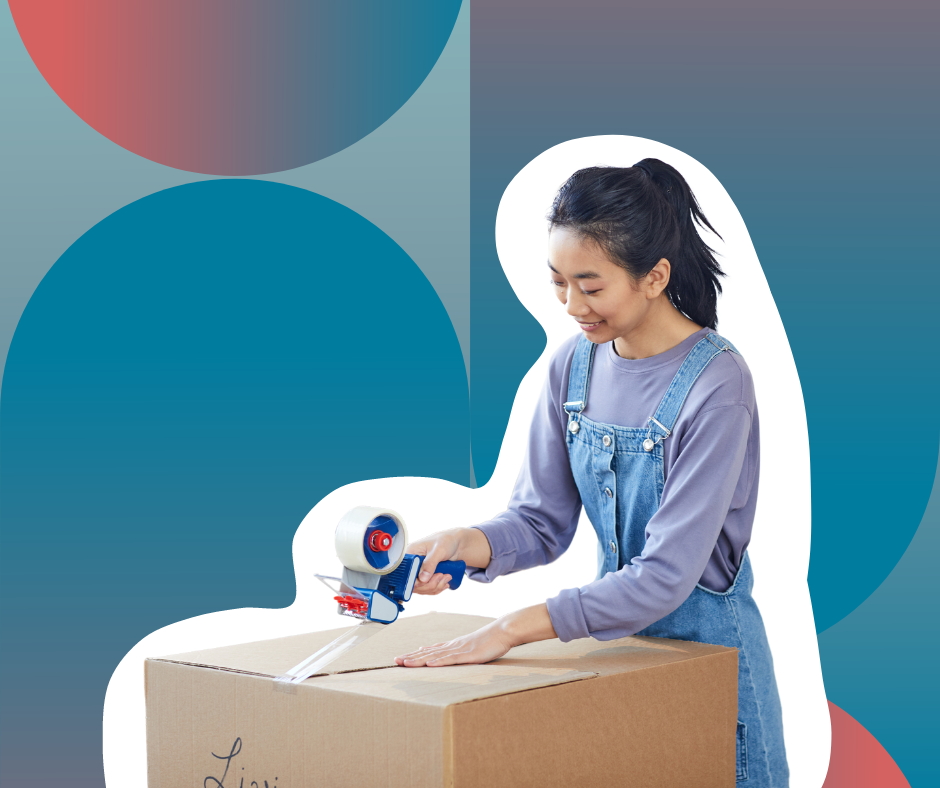
Make the most of your recycling bins. If you’re in halls, the staff will be able to explain the recycling options. If you’re in private accommodation, you can put paper notebooks, flyers, and leaflets in the paper and card bin.
Aerosols, empty perfume bottles, bleach bottles and more go into the mixed recycling. Get a reminder of all the things you can recycle at home here.
Did you know even ripped or stained clothes can be recycled? Just make sure they’re clean and dry, bag them up and take them to a clothing bank.
Most big supermarkets have them. You can also use the clothing banks for re-wearable stuff you want rid of including your pub-golf fit. Your local charity shop will take clothes in good condition, but make sure to take donations inside. Leaving bags outside closed charity shops is fly tipping.
If you don’t want to take your heavy tins and dried food with you, donate them to your local foodbank for someone else to use.
When you’re getting rid of ancient condiments from the back of the fridge, the empty plastic bottles and glass jars can go into your mixed recycling bin. Glass can be recycled infinitely, and some of those jars might be older than you! Keep them in the loop by recycling.
Most of us have a collection of broken headphones and other tech hiding in a draw. Electricals (anything with a wire, plug, or battery) can’t go into your bins at home as they can cause fires.
You’ll find battery recycling points in most big supermarkets and some campuses have vape recycling bins. Use the Recycling Locator to find your nearest public recycling point.
If you’ve got access to a car you can take furniture and large items to 20 recycling centres across Greater Manchester. Theres a space to donate reusable furniture to Renew to be loved by someone else.
No car? Charities like Mustard Tree will collect furniture for free. If the furniture is beyond fixing most councils have a bulky waste collection service, find more details on your councils’ webpage.
You can donate everything from food to books to via the Give It Don’t Bin It donation points at the end of June. Your things will be redistributed to local charities including The British Heart Foundation and local foodbanks. Since 2012 students have donated 2,118,661 tonnes of stuff that have been shared with people who need it.
Got something that’s not on this list?
You can recycle pretty much anything at our recycling centres. Even if you don’t have a car, you can walk up to the gate and hand things over to the staff for recycling.

Shop our range of handpicked, vintage and preloved items via our online store or eBay page to find something truly special.
You can shop in person too – pop into one of our shops at the recycling centres in Altrincham, Irlam and Oldham for a selection of affordable decorations, kitchenware and furniture.
All of the items we sell have been donated by Greater Manchester residents at our recycling centres, and the money raised goes to good causes across the city-region through our Community Fund and the Greater Manchester Mayor’s Charity.
Many of the items in our shops are barely used, and some are even brand new.
…And much more!
Be in the loop by repairing instead of throwing away. Electronic waste is a huge problem in the UK, with so many appliances being thrown away before they’re truly broken.
Have you gone to heat up your tea and found your microwave sparking? Instead of forking out £80 on a new one, this £5 repair could be the solution to get your microwave back spinning safely.
If you’re certain no foil has found its way into the machine, a damaged waveguide cover might be the cause of the sparks. This small rectangle of silver card allows the microwaves rays to heat the food. If it gets dirty or damaged it can cause sparking and result in problems heating food. There’s no need for a full replacement appliance. Save yourself money and save the planets resources.
This guide will take you through the steps to replace your microwave waveguide cover. If you’re in any doubt about the safety of your appliance, always get a qualified technician to investigate for you.
*Always make sure electronics are unplugged before investigating or working on them*
Step 1:
Have a look at the waveguide cover.
It’s a silvery rectangle usually on the right-hand side, inside the machine. Is it looking dirty? Is it torn? Are there scorch marks from the sparks? If so, it needs replacing.
Step 2:
Order a replacement waveguide cover.
Go online and search ‘microwave waveguide cover’. You’ll find some designed to fit specific makes and models. We think it’s easiest to buy a sheet and cut the new cover to size.
Step 3:
Take out your old waveguide cover and trace the shape onto the new cover card.
Step 4:
Cut round your traced outline.
Step 5:
Fit the new waveguide cover, plug the microwave back in.
That’s it, all fixed! Now find yourself a treat to test your handy work and breath a sign or relief that you’ve not needlessly thrown away a microwave for the sake of a few inches of silver card.
Hannah from Tread Softly transforms unwanted furniture into beautiful one of a kind pieces. Hannah shares her upcycling tips with us on how to get started.
As we are becoming increasingly aware of the need to reuse and recycle, there has been a surge of interest in upcycling furniture. I started my business Tread Softly out of a desire to challenge mass produced consumerism and a throwaway society and to highlight the benefits of upcycling old and unwanted items as well as reducing the amount of mass produced ‘fast’ furniture entering the world.
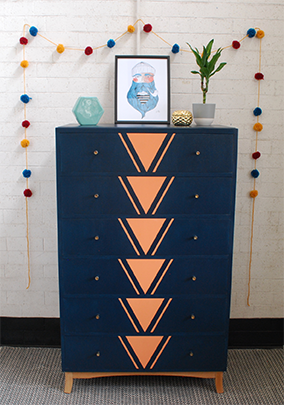
The best part of it, is that old furniture is often better made than the equivalent flat-packed furniture we get today and with a little bit of time, love and care, you can create a completely unique piece of furniture for your home that no one else will have. I also love that these pieces of furniture have a history of their own and through transforming and updating them we can breathe a new lease of life into them.
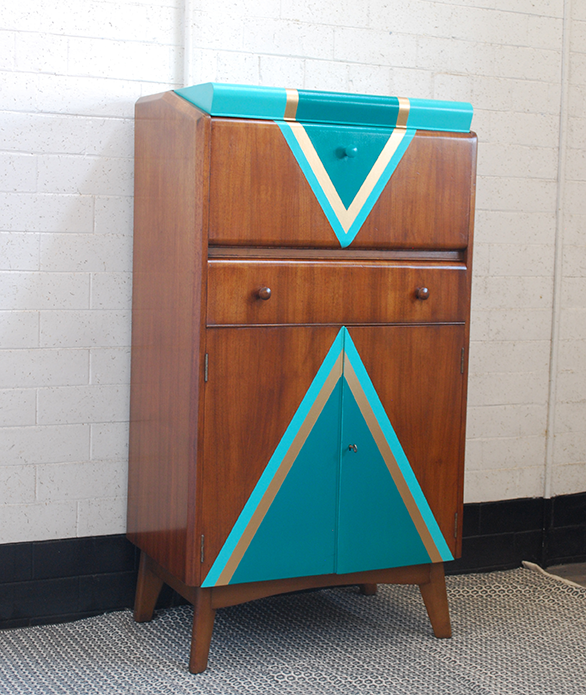
The idea of upcycling a piece of furniture can be a bit daunting at first but it’s not so difficult if you follow the steps. I taught myself how to do it and made many mistakes along the way, so hopefully I can save you a bit of time by taking you through the process.
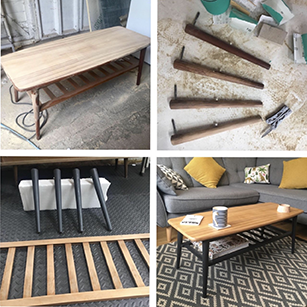
Here is a before and after photo of a coffee table that I upcycled for my lounge. I found it in a charity shop just around the corner from my home.
1. Clean item thoroughly with sugar soap or T.S.P and allow to dry
2. Check for any imperfections – fill any scratches or holes with wood filler and allow to dry
3. Sand item to take sheen off (‘key it’ to allow paint to stick)
Start with 80 grit and then move to a 120 grit.
– Can finish with a 180 grit to really smooth out any scratches from sanding.
(The higher the grit the less rough the sand paper)
– Always sand in the same direction as the grain of the wood
4. Use either a tack cloth or white spirit to remove all the dust created from sanding.
5. Now you are ready to paint!
Most of my furniture features at least some painted element and often I paint the entire piece. I love being able to experiment with colours and geometric shapes to give a dated piece of furniture a new lease of life. Paint is really good at hiding scratches and imperfections that it may have acquired in its previous life. I usually use a good wood paint (just make sure you paint with primer before applying) or Fusion Mineral paints (which do not require primer).
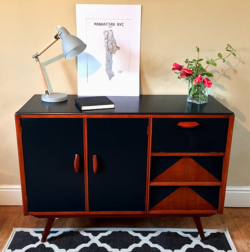
There are loads of gorgeous pieces of wooden furniture just waiting to be rescued from charity shops, so keep an eye out next time you are browsing. And if you feel a bit overwhelmed by taking on a big project then why not try doing some smaller items first such as wooden candle sticks, picture frames, trinket boxes or trays.
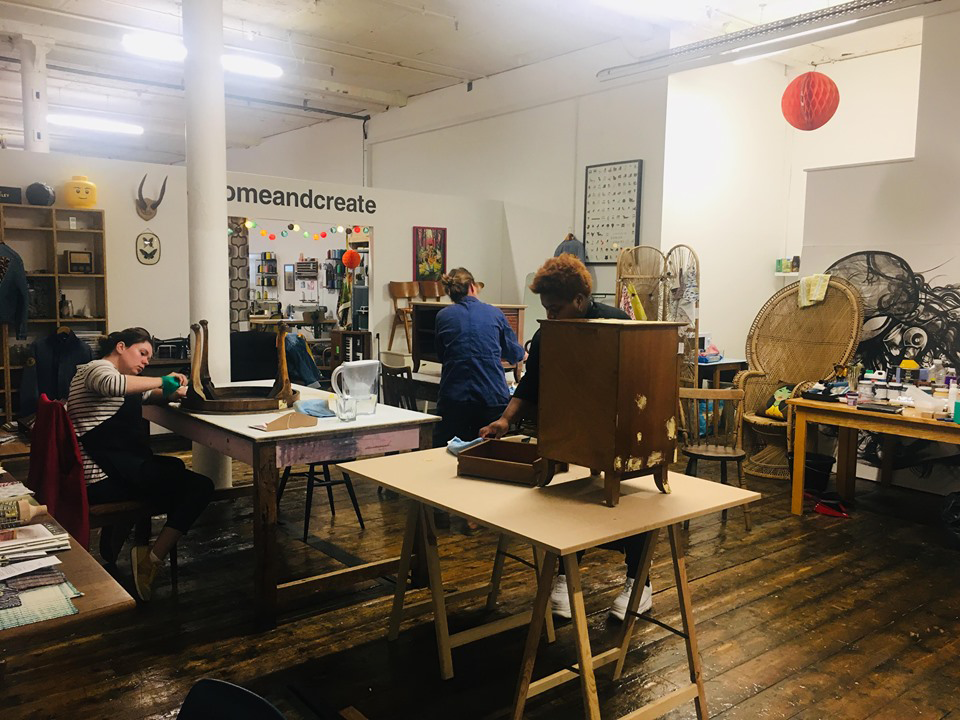
If you would love to have a go at upcycling and painting a piece of furniture but feel like you would benefit from some guidance then I run upcycling workshops from the gorgeous Pear Mill in Stockport. At the workshops, I talk you through how to prepare your furniture; from using wood filler to choosing the right sand paper as well as help with paint brush selection and advice on different top coats you can use. I will demonstrate how to use masking tape to create modern geometric designs so that you will leave feeling confident and full of ideas for future upcycling projects.
Hannah’s next workshop is on Friday 28th February and they take place once a month. To book a place and for more information visit www.treadsoftlydesigns.co.uk
Follow on Instagram @treadsoftlyuk
Life is getting more expensive by the minute and we’re all looking for ways to increase the cash in our pockets. There are huge savings to be made by investing in reusable and sustainable versions of things you use everyday. We’ve put together 6 switches you can make to start saving money. If your family of 4 did everything on this list you could save over £1670 a year!
Drying hands, sorting spills and general cleaning, towels are a necessity. Paper towels are made from trees which take decades to grow. Trees are brilliant at absorbing some of the excess CO2 we produce, cutting them down just so we can dry our hands is not very smart. What’s the sustainable option? Washable towels. We use fabric towels in the bathroom, so why not the whole house? By switching from paper to fabric towels for as little as £15 for a set, you could save hundreds a year. Granted, you need to wash them, but throw them in with your normal towels, pop a pile where the kitchen roll used to be and start saving money and trees.
Fancy £91 off your energy bill?
Swapping a traditional 100 watt bulb for a LED will save you £13 per bulb, per year. Older incandescent bulbs require up to 80% more energy as they produce a lot of heat. Using less energy benefits your pocket, but also means less fossil fuels are being burned. Arguably LED bulbs are pricier than incandescent bulbs, at about £5 each, so this swap might be best done when your old incandescent bulb comes to the end of it’s life.
Treat yourself and save £130 a year.
After the initial investment on your fabulous, personalised reusable cup, with a lid that actually stays in place (no more coffee dribbling on your t-shirt or sloshing about in the car) you can cash in on savings at coffee shops. Some high street chains like Pret a Manger will give you 50p off the price of your drink in a reusable cup. Costa will give you an extra stamp on your loyalty card, meaning you only buy 4 drinks instead of 8 to get a free one. If you’re a caffeine addict, this one is a no brainer.
Look good whilst saving £11
for the skincare lovers, and this swap doesn’t even require investment. To grow 1kg of cotton (the same size a t-shirt) it requires the same amount of drinking water as one person needs for 2.5 years! That and the nasty pesticides involved in growing cotton means a reusable option is much more sustainable than throwing away hundreds of pads each year. You can cut your own fabric pads from an old t-shirt or towel. It’s best to pop them into a little bag if washing in the machine so they don’t escape. If you want to buy a set of soft fabric wipes, that come with a handy little washing bag, it’ll set you back just £2 and you’ll get savings after less than 2 months.
£820 up in smoke.
Single use vapes contain precious elements like lithium, an important component in electric vehicle batteries. Vapes are also wrapped in plastic that can’t be recycled. Single use vape pens are not only terrible for the environment, they’re awful for your finances. If you vape everyday you could be burning through an extra £820 every year.
Even if you keep vaping to when you socialise at the weekend, single use vapes could be costing you 3 times as much as a reusable device.
Roll up for £250 worth of savings.
British people can feel a bit weird discussing what goes on in the loo, but bidets are the preferred way to clean up in many countries. A family of 4 flushes £250 worth of toilet roll down the drain every year.
Simple wall mounted hand-held bidets start from around £25 and you’d expect to use around £18 of additional water for 4 people.
These swaps won’t just save you money, they’ll help to conserve resources. The planets resources are running out quickly and we urgently need to change the way we consume to be able to continue to enjoy everyday things we take for granted. Reusing things to reduce the amount of stuff we throw away is a vital stage in the loop/Is vital to stay in the loop.
Learn more about being in the loop.
We are supporting the Greater Manchester Ageing Hub’s celebrations for International Day for older persons. Sow the City, who we are working with on our composting projects, have written this blog about how composting can be done in small spaces, when you don’t have access to a large open space.
Get your discount on Bokashi & compost bins here.
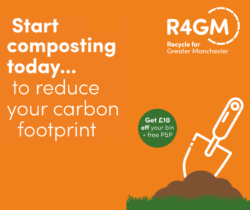
Composting doesn’t need lots of space, time, and energy. There are simple, cheap, and efficient ways that you can get composting right now, in small spaces, balconies, and even indoors.
Creating your own compost helps save money, helps you grow healthy indoor and outdoor plants, and minimises your impact on the environment. Below are some tips to composting when you have limited space to work with.
Looking to make use of a wide variety of kitchen scraps? Vermi-composting may be the answer! This method uses a bin full of worms to break down peelings and cardboard, to produce a harvest of wonderful worm-fuelled compost for your house and garden plants.
A worm bin will take up very little space and can even be placed in a cupboard or under the sink in your kitchen. You can buy a ready–made worm composting kit or make one quite easily yourself. And don’t worry – the process is fuss and odour free.
Composting with worms can take as little as three months, worms will eat a wide variety of food waste, like the items you’d stick in your food waste recycling bin – avoid citrus, onions, bread, meat, and dairy. Vermi-composting requires very little physical effort to maintain compared to a typical composting which works best with regular turning.
You can make your own wormery using materials found at home. Take a look at this video for a simple how to guide. The worms used for composting can all be bought online! Choose brandling, manure, red or tiger worms for the best results.
Another option is the exotic sounding bokashi! The word is Japanese and translates to “fermented organic matter”. This technique coverts your kitchen waste into a fermented soil supplement in as little as 10 days. You can compost an even wider variety of kitchen scraps in this way, including fruit, veg, meat and dairy. The special ingredient is a bokashi inoculant, this is usually made up of some kind of wheat germ or sawdust with molasses, which acts as food source for a micro-organism. This inoculant can be bought quite cheaply online, or you can even make your own.
The whole process happens in a bokashi bucket, which has an airtight lid and a tap at the bottom to drain off any liquid preventing the bucket from getting too smelly. What’s created after a couple of weeks is a fermented mixture which can be dug directly into the soil or added to a compost bin.
Recycle for Greater Manchester are working with Get Composting to provide residents in Bolton, Bury, Manchester, Oldham, Rochdale, Salford, Stockport, Tameside, and Trafford the opportunity to get a discounted price on bokashi bins!
If you love a brew, and you love your house and garden plants, it’s win-win with this simple technique! Coffee grounds act as a natural fertiliser, and can provide a healthy dose of nitrogen, an essential nutrient for plant growth and metabolism. Using coffee can deter pests, improve soil quality, and even keep cats away.
The best way to use coffee grounds on your plants is to apply as a mulch or top-dressing to the soil. Around a spoonful of coffee grounds can be added every 4 to 6 weeks. Some houseplants particularly enjoy coffee grounds including peace lilies, Christmas cactus, miniature roses and jade.
Coffee can also be added to an existing compost heap, or you can use leftover cold liquid coffee mixed with tap water to make a simple plant fertiliser.
Find out more about using coffee as a fertiliser in your home and garden here.
Leaf mould is just decomposed leaves that have been broken down by fungus.
Good quality, well-rotted leaf mould (more than two years old) can be used as seed-sowing compost, or mixed equally with sharp sand, garden compost and good quality soil for use as potting compost.
Leaf mould that is less than two years old can be used as mulch, soil improver (worms love it!) autumn top-dressing for lawns, or winter covering for bare soil.
Yes, but some types of leaves break down quicker than others.
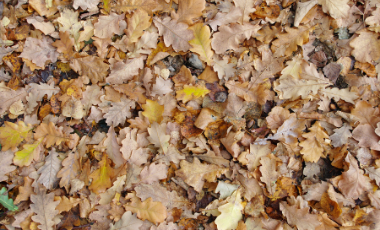
Leaves from evergreens, conifers and pines are slow to decompose. It is better to add these to your compost heap.
It’s totally fine to use your lawn mower to shred any leaves together. Any grass clippings gathered at the same time will help to increase the nutrient value of the leaf mould. However, if your lawn contains weeds, be careful as you don’t want to be adding weed seeds to your leaf mould!
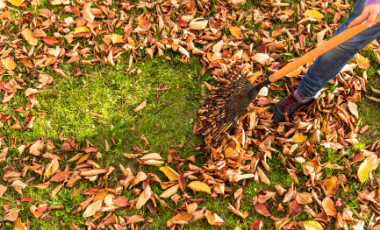
For more tips about composting, visit our Let’s Compost Now page.
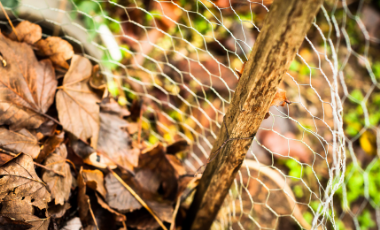
Most people are recycling right in Greater Manchester. However truck loads of paper and card collected last year couldn’t be recycled because some people are putting the wrong things in their paper and card bins and even purposely hiding rubbish in their bins.
This is a problem because companies that process paper and card only want dry paper and card recycling. Wrong things in the recycling bin, lowers the quality which means they can’t recycle it and it will end up being processed as general waste instead.
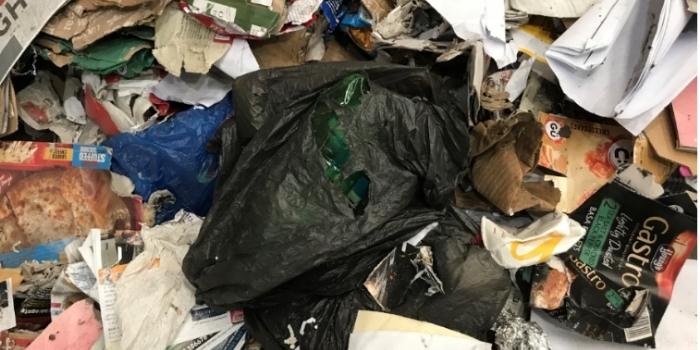
For every tonne of poor quality paper and card which has to be processed as general waste, costs your council, on average, an extra £88 per tonne – that’s up to £520 per truck load.
In June, 168 lorry loads were rejected, which is 833 tonnes.
When your paper and card recycling bins are collected and emptied they go to a transfer loading station in Greater Manchester where the truck load is inspected.
Things that we found include:
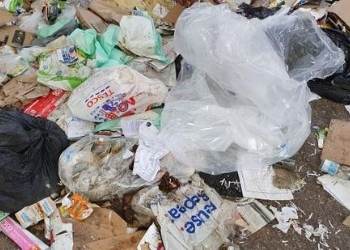
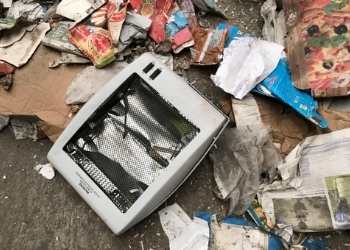
Hundreds paper and card bins are emptied every week across Greater Manchester. There are staff to inspect the quality of the truck loads but they only have minutes to do this – it is not their job to sort out other people’s rubbish.
No, good quality paper and card recycling is delivered to Saica a paper and recycling company in Carrington.
No, nappies and wet wipes are mostly made of plastic. Nappies and wet wipes should go in your general waste bin.
We need everyone in Greater Manchester recycling right.
Make sure you only recycle paper and card in your paper and card recycling bin. Nothing else.
These are the things you can put in your paper and card bin:
1. Tell your friends and family how to recycle right
2. Follow @recycle4gm on Facebook, Twitter and Instagram
3. Take part in a virtual open day and see what happens to your recycling
4. Subscribe to our newsletter
5. Tell your local school or community group to book a virtual visit to our recycling facility